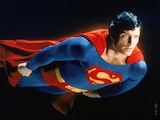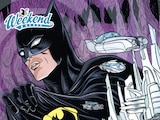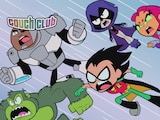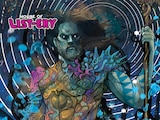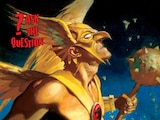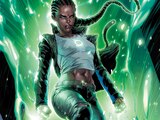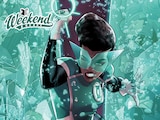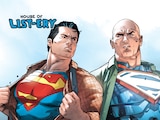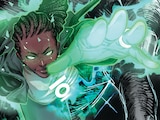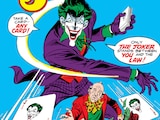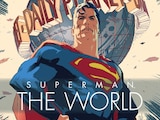DC’s first superteam is back and ready to kick some Nazi butt! Justice Society: World War II is a brand-new animated movie starring the JSA as they fight against the Axis forces in 1940s Europe. The latest installment in the popular DC Universe series of films, this look at DC’s Golden Age had an interesting journey from concept to screen…one that started as an idea for an animated series.
“Initially I was pitching this for DC Universe,” explains supervising producer Butch Lukic. “It was going to be a Wonder Woman series and I wanted it to be set in World War II. This was before the first Wonder Woman movie came out. We didn’t learn until later that they were going to do a World War I angle. At the time we never had the JSA involved, we just had Hawkman and some other characters in and out of that storyline.”
Once the Justice Society was added, the movie grew in scope, but choosing the roster was no easy task. “With a movie like this, you can only play with a certain number of heroes, otherwise the movie is unwatchable,” says co-screenwriter Meghan Fitzmartin. “You’d only get five seconds with each character. We went through and really thought about what story we were trying to tell and what characters served each other and that story. We made some really hard choices and I’m really proud of the team that we got out of it.”

“Certain characters, if we added them in, would’ve taken away from the other characters and their story arcs,” explains Lukic. “Right where it is, it’s perfect. You get a sense of all the characters that you need to know and a little bit more.”
These characters include Golden Age stalwarts like Hawkman. Famous for his complicated backstory, there’s no way a superhero like the iconic winged warrior would work in a movie that didn’t afford him the opportunity to breathe.
“I kind of honed in on the Golden Age version and just went off what was in the script and built the character from that,” reveals Omid Abtahi, who voices Hawkman in the movie. “In a way, it’s freeing because if people are still trying to figure out this character, then I have the liberty of giving my interpretation on it based on what I read.”
“There’s a moment in the film with Black Canary where there’s a break from the violence and it’s just the two of them talking about life, talking about love,” he continues. “It was a window into the soul of Hawkman.”

The scene finds Black Canary questioning the true cost of heroism, and it was a powerful moment for her voice actress Elysia Rotaru. “Why do heroes do what they do?” she wonders. “Do they want accolades? Do they want fame? She realizes it’s for a greater cause—for humanity. It also shows how young she is. She’s lived the life, but she’s still a little babe and has a lot to learn.”
Of course, the real joy for Rotaru was being able to do her own Canary cry. “That one was really friggin’ fun,” she says. “We powered through the script and we get to that cry. It was just really fun to vocally go there and see where my voice could go.”
For much of the film’s cast, including Hourman actor Matthew Mercer, getting to work on a Justice Society movie was a great excuse to do a comic book deep dive.
“I was more familiar with the modern version of Hourman,” Mercer admits. “For this version, I had to go and do research, and that was part of the fun. I will take any opportunity to do deep dives into comics when it’s considered work. It was really cool to go back and see where this started and what makes Rex Tyler unique. He’s the most human of the JSA. He only has his power set for a limited period of time and he has to hold his own and feel like he’s contributing. How does a hero who is really only a hero for an hour feel like he’s still part of a team outside of that?”

Meanwhile, Justice Society: World War II offered one member of its cast the chance to tackle his dream role.
“I would die to be Aquaman, fortunately I didn’t have to,” says Liam McIntyre with a laugh. “I came in with some ideas of who I thought he was. He’s the noble king of the sea and so I thought he might’ve been more British. We played around with a few different things. I think we might’ve even tried it as Australian once, but we realized it didn’t work two words in. We settled on a posh Spartacus in a way, which is a mid-Atlantic thing where he was British but had some American sensibilities with his pronunciations.”
Justice Society: World War II stands apart from other DC superteam movies for more than just its retro setting. In a welcome update, it’s Wonder Woman who leads the team, offering fans a potent reminder of just how skilled the Amazon is in battle. Stana Katic, who TV fans might know from the series Castle or the more recent Absentia, was ecstatic about playing Wonder Woman, who was a childhood hero for her.
“For much of the globe, Wonder Woman is part of the ether,” she enthuses. “She’s part of our world consciousness. I grew up with Wonder Woman on television in both live action and animation. This is a character that has always been a part of my consciousness. Butch Lukic and (voice director) Wes Gleason wanted to honor Wonder Woman’s mythology. They wanted to have an accent. They offered a region and I was given free rein to play with that.”

Much like in her big screen, live-action forays, the heart of Justice Society: World War II is Wonder Woman’s relationship with Steve Trevor. During the movie, Steve tries to convince Diana to marry him, but Wonder Woman wants to win the war before she settles down.
“The proposals are part of the love that Steve and Diana have, and if they really bothered Diana, he would stop it,” says Fitzmartin. “He’s not doing it to be annoying or obnoxious. He wants to connect with her and break through those walls.”
“Wonder Woman is in a position of leadership with the JSA, and the task of overcoming the evil of Nazism is extremely overwhelming,” Katic explains. “It needs all of her focus. What she realizes in the end is that it’s important not to miss out on life in the process of saving the world. I have to give major props to Chris Diamantopoulos, who played Steve. He added this roguish quality to his character. He was charming and I feel like that’s where a lot of the chemistry plays.”

The relationship between Diana and Steve proved to be a motivating one for Fitzmartin and her co-screenwriter Jeremy Adams, who worked together to find the right balance for the romance.
“Jeremy is much more of the romantic one, and I want everything to be as sad as possible,” admits Fitzmartin. “We had to balance each other out. His instincts were correct and I’m glad he pushed for it.”
Justice Society: World War II is the first DC Universe movie since 2008’s Justice League: The New Frontier to be set during the dawn of superheroes and the first to take place entirely in wartime. More than just a subtitle, the World War II setting is an important part of the film’s DNA and the production team worked hard to make it as authentic as possible.
“I used to watch black and white war movies with my mother,” shares director Jeff Wamester. “As a kid I was either reading comics or watching old movies. My grandfather was a World War II veteran and we used to go through his medals. I had a ton of exposure to that.”

Adams took the term “deep dive” literally when it came to doing background research. “I researched submarines,” he says. “What the submarines in that timeframe were capable of and learning about their batteries—that was a huge part of my research.”
While the horrors of the second World War have no equal, there are undoubtedly comparisons to be made to our current moment in time, which finds the world engaged in an entirely different kind of struggle—and without the benefit of superheroes to help us wage it.
“This has been a very difficult year for everyone, and I think that we want stories that we can relate to and grow from,” suggests McIntyre. “I feel like this is escapism at its best and an interesting view on a very difficult time in human history and how to rise above it and better yourself. It’s just an awesome film.”
“You get to watch Nazis get beat up, which is always great,” exclaims Mercer. “You also get a really cool modern retelling of Golden Age comics and the opportunity to learn where these characters and stories came from.”
“It’s Raiders of the Losk Ark on steroids with superheroes,” teases Lukic.
Seriously, what more do you need?
Justice Society: World War II, the next entry in the popular series of DC Universe Movies, is now available digitally. Look for it on 4K Ultra HD Blu-ray Combo Pack and Blu-ray on May 11th.
Joshua Lapin-Bertone writes about TV, movies and comics for DCComics.com and writes our monthly Batman column, "Gotham Gazette." Follow him on Twitter at @TBUJosh.


